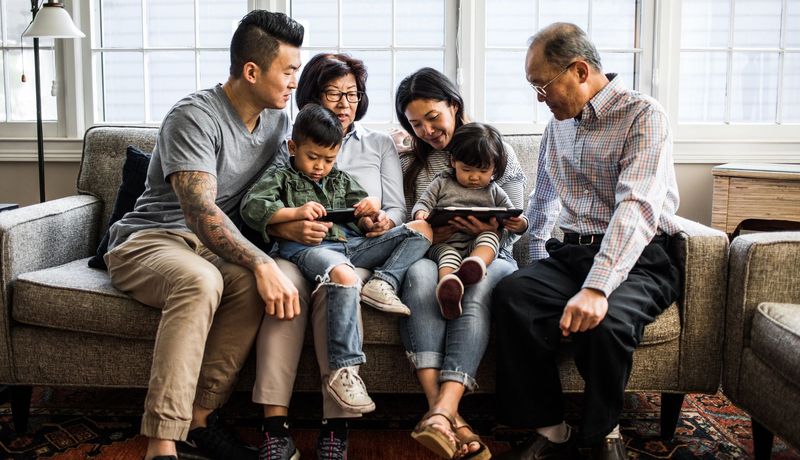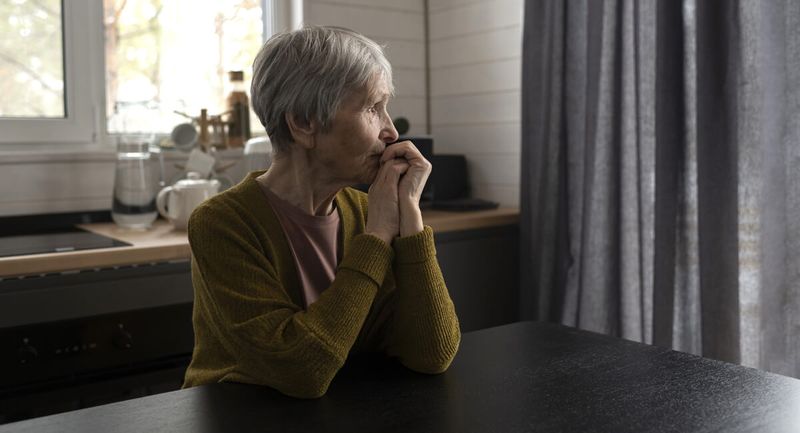Marriage is a complex journey, and for women over 60, the decision to stay in an unsatisfying relationship can be particularly poignant. The reasons are varied and deeply personal, often intertwined with emotional, social, and practical considerations.
This article explores 13 reasons why women over 60 might choose to remain in a marriage that no longer fulfills them. Additionally, we’ll look at 5 common mistakes that make it even harder to leave.
1. Worry about disrupting family harmony
The desire to preserve family unity can weigh heavily on the minds of older women in unhappy marriages. The thought of causing a rift can be daunting, especially when children or grandchildren are involved. They might fear that leaving would disrupt cherished family traditions or gatherings. This emotional burden can lead them to prioritize family harmony over personal happiness.
Many believe that enduring the discomfort is a sacrifice worth making for the sake of their loved ones. The fear of alienating family members or being blamed for family discord makes the decision even harder. In the end, their choice often reflects a deep-seated commitment to family values and enduring love.
2. Fear of judgment from peers
For many women over 60, societal perceptions and peer judgment can heavily influence their decision to stay in a marriage. The fear of gossip or being viewed as a failure by friends can be paralyzing. In many communities, marriage is still seen as a lifelong commitment, and breaking that bond can imply personal shortcomings.
This judgment is not just about failure but also about deviating from the norm. The shaming whispers of conforming to traditional roles can make the prospect of leaving seem daunting. Therefore, maintaining appearances often takes precedence, leaving personal contentment to wither in the shadows.
3. Belief that suffering quietly is strength
For some women, enduring hardship silently is seen as a form of strength. This belief can be deeply ingrained, especially in generations where stoicism was valued. The notion of enduring life’s challenges without complaint is often tied to dignity and resilience.
Many women have grown up witnessing their mothers or grandmothers bear life’s burdens silently, equating this endurance with fortitude. However, this attitude can lead to internalized pain and unvoiced needs. The quiet suffering becomes a badge of honor, masking the deep longing for change. Yet, the strength they project often hides a vulnerable heart yearning for happiness and peace.
4. Thinking financial security is more important than emotional peace
Financial stability often becomes a significant consideration for women contemplating leaving their marriages. The fear of financial insecurity can be daunting, especially if they have been financially dependent on their spouse. For women over 60, the prospect of starting over economically might seem insurmountable.
The comfort of knowing bills are paid and basic needs are met often outweighs the pursuit of emotional fulfillment. Unfortunately, this prioritization of security can lead to a life of quiet desperation. The trade-off between financial stability and emotional peace is a harsh reality many face. They weigh their options carefully, often choosing security over happiness.
5. Comfort in routine—even when it’s painful
Routines provide a sense of normalcy, even if they are filled with dissatisfaction. For many women, the predictability of daily life becomes a comfort zone. Breaking away from a familiar, even painful, routine can seem more overwhelming than staying. The thought of leaving behind decades of established habits and rhythms is terrifying.
This attachment to routine offers a semblance of control and predictability amidst emotional turmoil. Often, the fear of the unknown outweighs the desire for change, leading them to stick with what they know. This adherence to routine becomes a silent acceptance of unhappiness, masked as stability.
6. Not wanting to be seen as the one who gave up
The stigma of being perceived as someone who ‘gave up’ can be a powerful deterrent. In many cultures, women are expected to uphold the sanctity of marriage, regardless of personal cost. The fear of being labeled as the one who couldn’t endure or hold the marriage together is profound.
This societal expectation often binds women to their marital vows, even when they are unfulfilled. They worry about what others might say or think, leading them to stay in a marriage that does not bring joy. This internal conflict between societal expectations and personal happiness can be a heavy burden to carry.
7. Guilt about “wasting decades”
The realization that they’ve spent decades in an unfulfilling marriage can bring about a profound sense of guilt. Many women feel that leaving now would mean admitting that those years were wasted. This guilt is compounded by the fear of starting over at an older age, when life’s roadmap appears shorter.
The thought of leaving behind shared memories and history can be heart-wrenching. They question whether the remaining years would be enough to find happiness anew. This guilt, intertwined with fear of the unknown, often keeps them in place, silently hoping for a resolution that may never come.
8. Hoping for change that never comes
Hope is a powerful motivator, and for many women, it can be a reason to stay in an unsatisfying marriage. They cling to the belief that things will improve, that their partner will change, or that love will reignite. This hope often sustains them through difficult times, fueling dreams of a happier future.
However, this anticipation can become a trap, keeping them in a cycle of waiting. The emotional investment in ‘what could be’ overshadows the reality of ‘what is.’ This hope, while comforting, often prevents them from acknowledging the need for change and taking steps towards it.
9. Not wanting to be alone in old age
The fear of loneliness is a significant factor for many women contemplating leaving their marriages. The prospect of facing old age alone can be overwhelming. Companionship, even if unsatisfying, provides a semblance of comfort and security. The thought of navigating life’s later years without a partner can seem a daunting and isolating prospect.
This fear often keeps them tethered to marriages that no longer serve them well. The emotional and physical support a partner provides, despite the lack of fulfillment, outweighs the desire for independence. They choose known companionship over the uncertainty of solitude.
10. Cultural or religious pressure to stay
Cultural and religious beliefs can exert strong pressure on women to remain in their marriages. Many religious doctrines emphasize the sanctity and indissolubility of marriage, which can lead to internal conflict for those feeling unfulfilled. The fear of community ostracism or spiritual condemnation often deters them from seeking separation.
Cultural norms may promote the idea that a woman’s role is to preserve the family unit at all costs. These pressures can be deeply ingrained, making the prospect of leaving seem not only daunting but also morally wrong. This internal struggle often keeps them bound to their marital vows.
11. No experience living independently
Having spent most of their lives within a marital framework, many older women have little to no experience living independently. This lack of experience can make the thought of leaving seem insurmountable. The fear of managing finances, housing, and daily life without a partner’s support can be paralyzing.
The comfort of familiar routines, despite their dissatisfaction, feels safer than venturing into the unknown. This dependency is not just financial but emotional and logistical. They worry about their ability to cope with life’s challenges on their own, often leading them to remain in marriages that offer little happiness.
12. Assuming no one would understand
The feeling of being misunderstood can be isolating, especially for older women contemplating leaving their marriages. They might assume that no one would understand their struggles or support their decision to leave. This perceived lack of empathy from friends and family can be daunting.
The fear of being judged or not taken seriously keeps many women silent about their dissatisfaction. They worry that their feelings will be dismissed as trivial or that their reasons for wanting change won’t be seen as valid. This assumption of isolation often prevents them from seeking the support they need to make a change.
13. Still feeling some emotional attachment, even through pain
Emotional bonds can be incredibly strong, even when a relationship is fraught with challenges. For many women, the love and history shared with a partner can overshadow the pain experienced. Memories of better times, shared experiences, and deep-seated affection often linger, making the decision to leave complex.
The heart’s attachment to what once was can complicate the desire for change. This emotional tether keeps them hoping for a return to those joyful moments. Even amidst dissatisfaction, the emotional connection can prevail, binding them to a marriage that no longer fulfills their needs, yet still holds fragments of past love.
On top of that, there are also mistakes that make it even harder for them to leave. Here are 5 most common mistakes:
1. Ignoring emotional red flags for years
Ignoring emotional red flags can accumulate into a significant barrier to leaving an unsatisfying marriage. Over the years, small issues are often brushed aside or rationalized away. This gradual accumulation leads to a blurring of what’s acceptable in a relationship. Many women find themselves at a crossroads, where years of overlooking issues make them question their own judgment.
The fear of confronting these accumulated problems can be overwhelming. This habit of ignoring signs becomes a cycle that is hard to break, leaving them entangled in a relationship that no longer serves them, yet feels too familiar to leave.
2. Keeping feelings bottled up
For many women, expressing dissatisfaction or emotional needs can feel daunting. Keeping feelings bottled up becomes a way of life, creating an internal pressure cooker. The fear of confrontation or being misunderstood often silences their voices. Over time, this repression of emotions can lead to resentment and a sense of isolation.
The inability to communicate their needs leaves them feeling unheard and unvalued. This silence, while intended to keep the peace, often leads to deeper emotional chasms. The habit of bottling up emotions makes it harder to advocate for oneself, further entrenching them in an unhappy marital situation.
3. Isolating from friends who could help
Isolation from supportive friends can be a significant barrier when contemplating leaving a marriage. Over the years, many women find themselves pulling away from friendships that could provide emotional support. The fear of judgment or the desire to maintain marital privacy keeps them distanced. This self-imposed isolation can lead to feelings of loneliness and helplessness.
Friends who might offer perspective or encouragement are left in the dark. Without a support network, the prospect of making a significant life change feels even more daunting. The absence of this social support often leaves them feeling trapped in their current situation.
4. Doubting your own version of the story
Auto-dúvida can be a paralyzing barrier for women contemplating leaving an unhappy marriage. Over the years, conflicting narratives can blur their understanding of the relationship. Many find themselves questioning their memories and feelings, unsure if their dissatisfaction is justified. This internal conflict often stems from years of emotional manipulation or gaslighting, leading to a shaky sense of self-trust.
The lack of confidence in their own experiences makes it difficult to take decisive action. This self-doubt creates a cycle of inaction, where the fear of making the wrong choice paralyzes them, keeping them in a state of indecision.
5. Waiting for permission to choose yourself
For many women, the concept of choosing oneself over familial or marital obligations feels foreign. The idea of prioritizing personal happiness might seem selfish, leading them to wait for external validation. This need for permission often stems from societal expectations that value selflessness over self-care.
The fear of being viewed as selfish or self-centered keeps them waiting for an external push to make a change. This waiting game can last for years, leaving them stuck in an unfulfilling relationship. Embracing the idea that they deserve happiness in their own right is a significant hurdle to overcome.



















